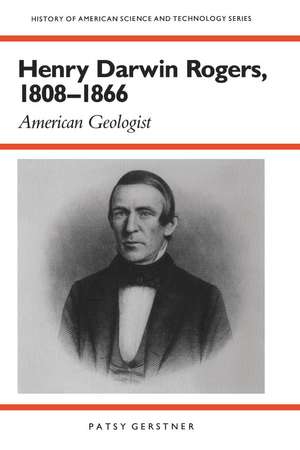Henry Darwin Rogers, 1808–1866: American Geologist: History of American Science and Technology
Autor Patsy Gerstneren Limba Engleză Paperback – 19 dec 2014
Henry Darwin Rogers was one of the first professional geologists in the United States. He directed two of the earliest state geological surveys--New Jersey and Pennsylvania--in the mid-1830s. His major interest was Pennsylvania, with its Appalachian Mountains, which Rogers saw as great folds of sedimentary rock. He belived that an interpretation of these folds would lead to an understanding of the dynamic processes that had shaped the earth. From Rogers' efforts to explain these Pennsylvania folds came the first uniquely American theory of mountain elevation, a theory that Rogers personally considered his most significant achievement.
Preț: 297.89 lei
Nou
Puncte Express: 447
Preț estimativ în valută:
57.00€ • 59.64$ • 47.35£
57.00€ • 59.64$ • 47.35£
Carte indisponibilă temporar
Doresc să fiu notificat când acest titlu va fi disponibil:
Se trimite...
Preluare comenzi: 021 569.72.76
Specificații
ISBN-13: 9780817358198
ISBN-10: 0817358196
Pagini: 326
Ilustrații: 9
Dimensiuni: 152 x 229 x 28 mm
Greutate: 0.45 kg
Ediția:First Edition, First Edition
Editura: University Of Alabama Press
Colecția University Alabama Press
Seria History of American Science and Technology
ISBN-10: 0817358196
Pagini: 326
Ilustrații: 9
Dimensiuni: 152 x 229 x 28 mm
Greutate: 0.45 kg
Ediția:First Edition, First Edition
Editura: University Of Alabama Press
Colecția University Alabama Press
Seria History of American Science and Technology
Notă biografică
Patsy Gerstner is Chief Curator, Historical Division, Cleveland Health Sciences Library, and Adjunct Associate Professor of History at Case Western Reserve University.
Descriere
Henry Darwin Rogers was one of the first professional geologists in the United States. He directed two of the earliest state geological surveys--New Jersey and Pennsylvania--in the mid-1830s. His major interest was Pennsylvania, with its Appalachian Mountains, which Rogers saw as great folds of sedimentary rock. He belived that an interpretation of these folds would lead to an understanding of the dynamic processes that had shaped the earth. From Rogers' efforts to explain these Pennsylvania folds came the first uniquely American theory of mountain elevation, a theory that Rogers personally considered his most significant achievement.




